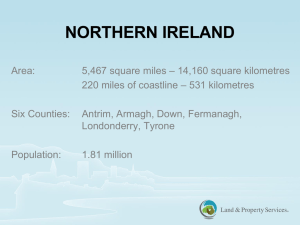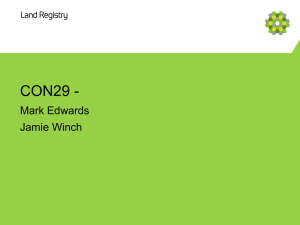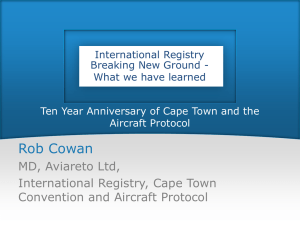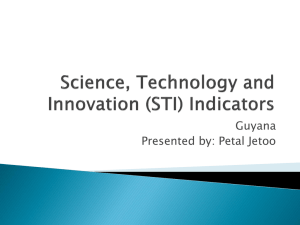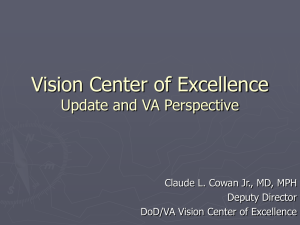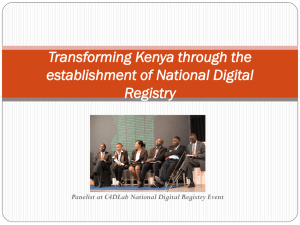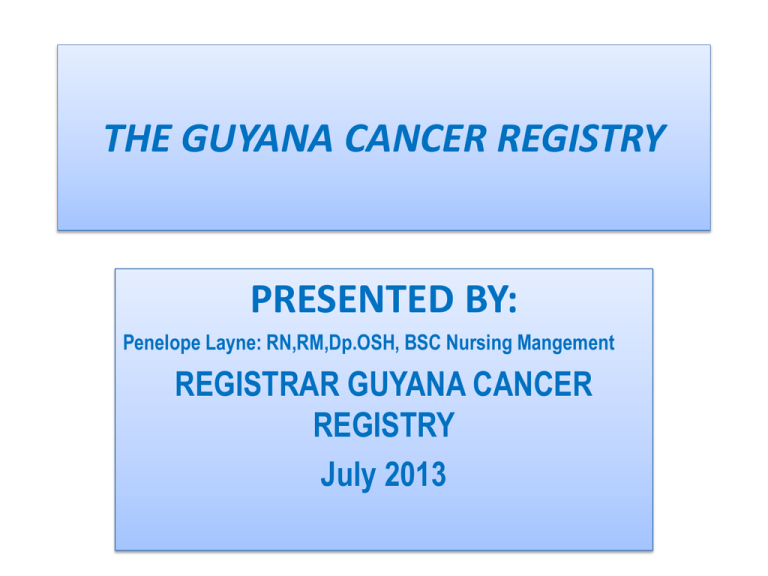
THE GUYANA CANCER REGISTRY
PRESENTED BY:
Penelope Layne: RN,RM,Dp.OSH, BSC Nursing Mangement
REGISTRAR GUYANA CANCER
REGISTRY
July 2013
STAFF
In addition to the Registrar the registry has:
1. Two registry officers responsible for the
collection and abstraction of data from all
sources.
2. One data entry clerk whose responsibility it
is to enter all data collected.
INTRODUCTION
At both the national and community level,
cancer registration schemes are central to
research into the nature and causation of
cancer and to the planning of health service
resources and cancer control programs.
INTRODUCTION
The need to learn more about the cause of
cancer, to identify those at risk, and the most
effective modalities of treatment requires a
vast amount of data to be collected, studied
and evaluated. The Cancer Registry is the basic
tool used in this process.
THE GUYANA CANCER REGISTRY
When the Guyana Cancer Registry was
established in May of 2000, cancer was the fifth
leading cause of death in Guyana and of grave
concern to a group of physicians. The Ministry
of Health listened to the concerns of these
physicians who were calling for the
establishment of a “Population Based National
Cancer Registry”
THE CANCER REGISTRY
By the end of 2008, cancer was the third
leading cause of death overall, the third leading
cause of death in males and the fourth leading
cause of death among females. The Registry
provided and continues to provide such data to
our country’s chronic diseases department.
OBJECTIVES OF THE CANCER REGISTRY
As a population based registry we:
Collect and process relevant data from all
health institutions, laboratories and medical
practitioners in both the public and private
sectors where available;
Facilitate the exchange of information on
cancers, its treatment and follow up
management (if available);
OBJECTIVES
Improve the quality and accuracy of available
data on mortality and morbidity relating to
the incidence/prevalence of Cancer in
Guyana;
Provide health authorities with reliable data
to facilitate the planning and administering of
comprehensive cancer services including
cancer prevention and control.
FUNCTIONS OF THE REGISTRY
Maintenance of a data base of all positive
cases of cancers occurring in Guyana in which
the clinical and pathological characteristics of
the cancers are collected continuously and
systematically from various data sources
documented.
FUNCTIONS
Dissemination and exchange of information
derived from the Cancer Registry to health
personnel and health facilities locally and
internationally.
Analysis and interpretation of data and the
provision of quality information to health
professionals and the general public.
FUNCTIONS
Collection of accurate data thereby providing
programs of interest on cancer to hospitals,
patients, members of the public and health
care professionals.
RELATIONSHIP TO THE MINISTRY OF
HEALTH
part of the chronic diseases program
Shows early indicator in shift of the geographical
distribution of cancer.
Tells the burden of the disease.
Assist the Ministry in planning programs relating
to cancer control.
REGISTRATION PROCESS
(How data is collected)
Data is actively collected from the costal and
all major regions of Guyana.
More than twenty five (25) health units are
covered by the two Registry Officers.
All suspected cases of cancer are referred
from the outlined regions to the National
Referral hospital in Georgetown.
How data is collected
(contd.)
The Registry partnered with “The Rural Area
Medical” team (a nonprofit private
organization).
This partnership produced valuable
information that was shared with the registry.
Information was obtained from the far flung
regions of Guyana.
CONSTRAINTS TO CANCER
REGISTRATION IN GUYANA
The registry has passed through its teething
phase. However,
We still loose those persons diagnosed in
some interior areas. There is no follow up.
There is still a small percentage of persons
who receive treatment out of Guyana.
We believe we are still only capturing 80% of
our cancer cases.
SUCCESSES
Complete access to the Guyana Cancer Institute
for the past five (5) years and counting.
Previously, the cancer registry was denied access
to this vital set of information.
Assistance from the RAM organization in
collecting much needed information on cervical
cancer in some rural areas. (they have now
started working in other outlined regions.)
SUCCESSES
The registry collaborated in the following
studies:
Breast cancer survival in women of African
descent living in the US and in the Caribbean:
“effect of place of birth”.
Prostate Cancer characteristics and survival
in Males of African Ancestry.
SUCCESSES
(contd)
Cancers among women in the Guyanese
population 2005 – 2010. A paper presented
by the Registrar at the 2012 conference of
the AC3 collaborative group in Philadelphia.
This paper was also accepted for
presentation at the 2012 International
Association For Research on Cancer at their
conference held in Scotland.
SUCCESSES
(contd)
An increase in the use of our data by
students of the university of Guyana.
Students, not only in the Faculty of Health
Sciences, are using the data for various kinds of
research.
FUTURE PLANS
Educational interventions are planned around
data collection from hospitals.
The registry hopes to collaborate with PAHO in
the production of brochures with pertinent
information on all cancers.
Currently in the process of a ten year report on
all cancers in our data base.
MAJOR CANCERS
THE END
THANK YOU FOR YOUR
PATIENCE
QUESTIONS?????

